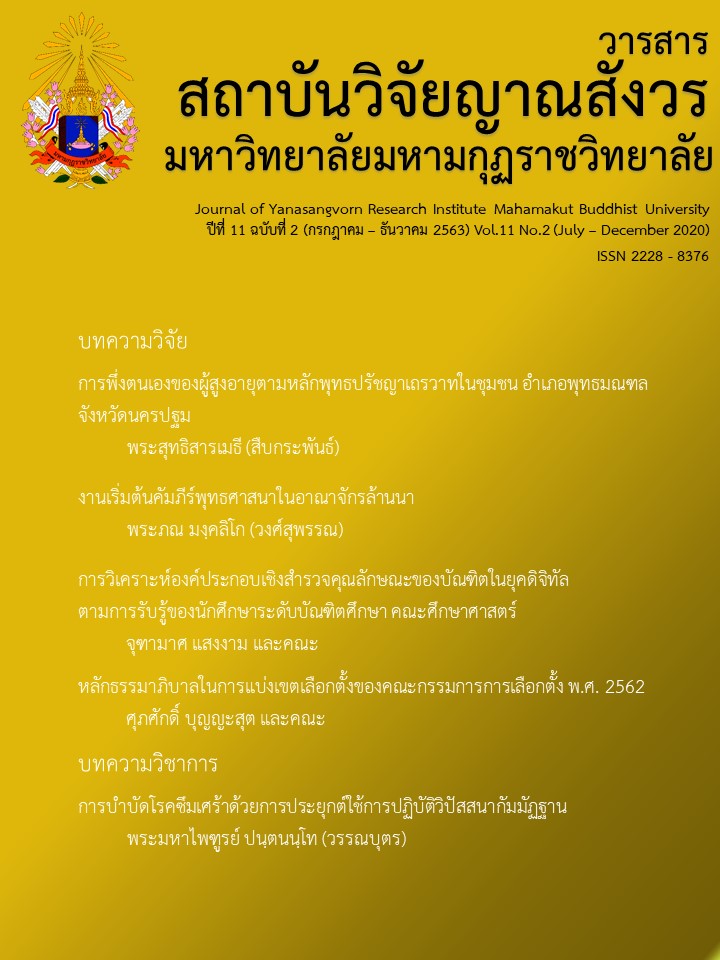HUMAN RESOURCE DEVELOPMENT BY BUNNIYOM SYSTEM OF ASOKA COMMUNITY IN BUDDHIST INTEGRATED APPROACH
Main Article Content
Abstract
The objectives of this dissertation were as for; 1) to study human resource development by Bunniyom or Puññist system or meritorious system of Asoka community, 2) to study human resource development according to Buddhism, 3) to integrate the Buddhist principles in human resource development with bunniyom system of Asoka Community, and 4) to propose approaches and knowledge body on "The Model of Human Resource Development by Bunniyom system of Asoka Community in Buddhist Integrated Approach". It is qualitative research. Have in-depth interviews with 10 experts and from focus group discussion with 5 experts.
The results indicated as follows: 1) Human Resource Development by Bunniyom system of Asoka Community. Lead to the development in 4 areas: self-development, Community development, culture, and economy. 2) The Buddhist principles used in the research are the threefold Training principles (Precept, Concentration, and wisdom), 10 principles of Puññakiriyavatthu, 6 principles of Saraniyadhamma, and 7 principles of Aparihaniyadhamma. 3) The good results occurring from the Integration of Buddhist principles with the Bunniyom system of the Asoka community are in 4 sides: Self-development for freedom, Community development for Integrity, Culture for having peace, Economics for creating Fraternity. And 4) The new body of knowledge gained from research is the "FIPF" Model. It means the four forms Bunniyom; freedom, integrity, peace, and fraternity.
Article Details
References
พระชัยณรงค์ วิทิโต (ร่องมะรุด). (2555). การประยุกต์หลักศีล 5 เพื่อพัฒนาพฤติกรรมของบุคคลในสังคม (ปริญญาพุทธศาสตรมหาบัณฑิต). มหาวิทยาลัยมหาจุฬาลงกรณราชวิทยาลัย, อยุธยา.
เพชรดินฟ้า ดิศโยธิน. (2550). การบริหารสวัสดิการสังคมแบบเศรษฐกิจพอเพียงในระบบบุญนิยม ศึกษากรณีชุมชนดินหนองแดนเหนือ จังหวัดอุดรธานี (ปริญญาสังคมสงเคราะห์ศาสตรมหาบัณฑิต). มหาวิทยาลัยธรรมศาสตร์, กรุงเทพมหานคร.
เพ็ญศิริ พันพา. (2545). ระบบบุญนิยม : การพัฒนากองทุนสวัสดิการชุมชนเพื่อการพึ่งตนเอง ศึกษาเฉพาะกรณีสาธารณโภคีศีรษะอโศก ชุมชนศีรษะอโศก จังหวัดศรีสะเกษ (ปริญญาพัฒนาชุมชนมหาบัณฑิต). มหาวิทยาลัยธรรมศาสตร์, กรุงเทพมหานคร.
รินธรรม อโศกตระกูล. (2549). ระบบบุญนิยมในชุมชนราชธานีอโศก จังหวัดอุบลราชธานี: นวัตกรรมสังคมจากภูมิปัญญาพุทธ. โครงการวิจัยนี้ได้รับทุนสนับสนุนจากสำนักงานคณะกรรมการวัฒนธรรมแห่งชาติ, กระทรวงวัฒนธรรม: สำนักงานคณะกรรมการวัฒนธรรมแห่งชาติ.
สมณะโพธิรักษ์. (2538). ข้าพเจ้าคิดอะไร. วารสารหนังสือพิมพ์เราคิดอะไร, 1(24), 14-17.
สุภาวดี ขุนทองจันทร์. (2559), การบริหารทรัพยากรมนุษย์อย่างบูรณาการ. วี.พริ้นท์ (1991). กรุงเทพมหานคร:


